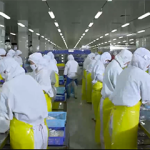NAPA launches “policy FIP” for Northeast Atlantic mackerel, Atlanto-Scandian herring

In a recent correspondence to the North East Atlantic Fisheries Commission (NEAFC) Heads of Delegation, the North Atlantic Pelagic Advocacy Group (NAPA) announced the launch of a new model of fishery improvement project (FIP) designed to drive political will for cooperative decision-making and secure sustainable management for key pelagic stocks.
The new “policy FIP” covers Northeast Atlantic mackerel and Atlanto-Scandian herring, which both recently lost their Marine Stewardship Council certifications due to a lack of coherent management between coastal states actors that would produce unilateral quota-setting. The ongoing disagreements between management bodies are a threat to the sustainability of these key stocks and have major implications for the purchasing decisions of the market, according to NAPA.
Responding to the removal of MSC certification in 2019 for mackerel and 2020 for herring, the policy FIP uses the framework of MSC assessment to identify specific areas for action, leading to a program of work and engagement to be undertaken between 2021-2024, NAPA said. The FIP was published on FisheryProgress.org in April 2021.
Unlike typical FIPs, which often focus on improvements in basic fisheries management, the NAPA policy FIP acknowledges that the pelagic stocks covered – Northeast Atlantic mackerel and Atlanto-Scandian herring – are in “the unusual position of being data-rich, well-understood, and with proposed management strategies published.”
NAPA said the barriers to enacting sustainable management “center around decision-making and political will,” hence the policy-focus of the FIP.
“It is vital a collaborative, long-term approach to managing key pelagic stocks is in place, which in turn will help us to meet the commitments to our consumers to provide ethical, sustainable products,” Co-op Fisheries and Aquaculture Manager Aisla Jones said in a press release. “The policy FIP is an excellent vehicle for us to drive this and we would urge coastal states to think of the FIP as a ‘business plan.’ Ultimately, the market needs to be comfortable with the management of these stocks to ensure a future supply base and promote healthy oceans.”
NAPA announced the launch of the policy FIP following the news that Norway has unilaterally increased its own quota by over 100,000 metric tons (MT) followed by a quota increase from the Faroes.
“Horse-trading and unilateral quota-setting is not responsible management. NAPA as a group are calling for political barriers to be put to one side, and for coastal states to make a simple, responsible decision: to follow the established science,” Tom Pickerell, the project lead, said. “With long-term, sustainable management in place these key commercial stocks can continue to thrive, and NAPA members can serve the global marketplace with confidence and security. Our goal? That coastal states come together and enact science-based, responsible management.”
NAPA is also working to expand the model, including the development of a similar tool for blue whiting. It is also working on a MarinTrust “improver program” for the fishery, which is an aquaculture feed-stock.
NAPA is a collective of 50 retailers and supply chain businesses, includes wholesalers, foodservice businesses, aquaculture producers, feed companies, and suppliers and processors. Its statement said the group believes the market should not tolerate continued “horse-trading” and actions that pose a threat to the overall sustainability of pelagic stocks.






Share